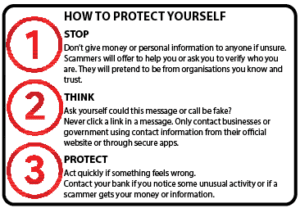The Best Scam Advice
When it comes to scams, older Australians have been identified as one of the most vulnerable cohorts. For that reason, over the years as scams have been increasingly catching Australians out. Here is some of our best advice, to help make sure you are fully informed and can protect yourself.
How scammers reach you
- Text or SMS scams – scam messages look like they are from the government, businesses you deal with or even your own family and friends.
- Phone scams – these cost Australians $141 million in losses last year.
- Email scams – they look like real emails, however, beware of links and attachments. These emails are designed to steal your money or information.
- Social media scams – these scams are on the rise, be suspicious of anyone contacting you out of the blue.
- Website scams – online scammers pretend to be anyone to deceive you into trusting them.
- In person scams – some scams take place face to face.
Common scams to watch out for:
- Romance scams – scammers use dating and friendship to get your money. They go to great lengths to convince you the relationship is real and manipulate you into giving them money.
- Investment scams – if you’re looking into investing, be careful, scammers have created all sorts of fake opportunities to take away your cash.
- Product and service scams – scammers prey on consumers and businesses that are buying and selling products and services. Not every transaction is legitimate.
- Threats and extortion scams – scammers will use any means possible to steal your identity or your money – including threatening your life or ‘hijacking’ your computer.
- Jobs and employment scams – these scams trick you into handing over your money by offering you a ‘guaranteed’ way to make fast money or a high-paying job for little effort.
- Unexpected money – they try and lure you with a surprise win. These scams trick you into giving money or personal information upfront to receive a lottery or competition that you never entered.
- Impersonation scams – identity theft is a type of fraud, This involves using someone else’s identity to steal money or gain other benefits.

Why are they scamming?
Scammers come from all over the world. Some work as individuals, some in groups, and their reasons for scamming also vary quite a lot. Some scammer motives include:
- Installing malicious software onto your computer or enabling remote access to gain access to your data and personal information and to steal money.
- Obtaining your personal information to carry out identity fraud.
- Deceiving you into paying fraudulent bills or fines.
- Gaining control of your computer or device and contact people you know.
- Obtaining your intellectual property.
Why do they work?
Scams work because they look like the real thing and can catch you off guard when you are least expecting it.
Taking advantage of new technology, new products or services and major events, scammers create believable stories to convince you to give them money or personal details.
Some scams are simple while others are more complicated, multi-step, often using the latest technology.
Always stop, think and check before you take any action. Scammers rely on you not identifying the warning signs because you’re in a hurry, you don’t want to miss a great deal, or because it appears to be from someone you trust.
What to look out for
While it can be hard to spot a scam, here are some things to look out for that may help:
- Its a ‘too good to be true’ opportunity to make or save money.
- Someone you do not know and haven’t met needs your help, and money.
- The message contains links or attachments.
- You feel pressured or rushed to act.
- They ask you to pay in an unusual or specific way.
- They ask you to set up new accounts or PayIDs.
If you have been a victim of a scam, be careful of future attempts. Did you know that 1 in 3 scam victims have been scammed more than once? Scammers will often try to scam you again, especially through ways including ‘helping you get your money back’.
What action to take?
There are immediate steps that you can take to limit the damage of a scammer and protect yourself from more loss. The most immediate things you should do include:
- Contact your bank or card provider to report the scam. And get them to stop any transactions and take relevant action.
- Report the scam to scamwatch.com.au to warn others.
- Watch out for any follow up scams.
- Get support to help you through your experience. This support can be anything from financial advice , reaching out to family or friends or a counsellor.
BEST TIP: the best way to avoid scams is to be informed. Stay informed by regularly checking the Australian Government Scamwatch website.
The information provided is general advice only on a limited range of scams. It has been sourced from scamwatch.com.au We suggest you visit the Scamwatch website for full and complete expert opinions and advice.
Want more information on how to protect yourself online? check out our other blog posts:











